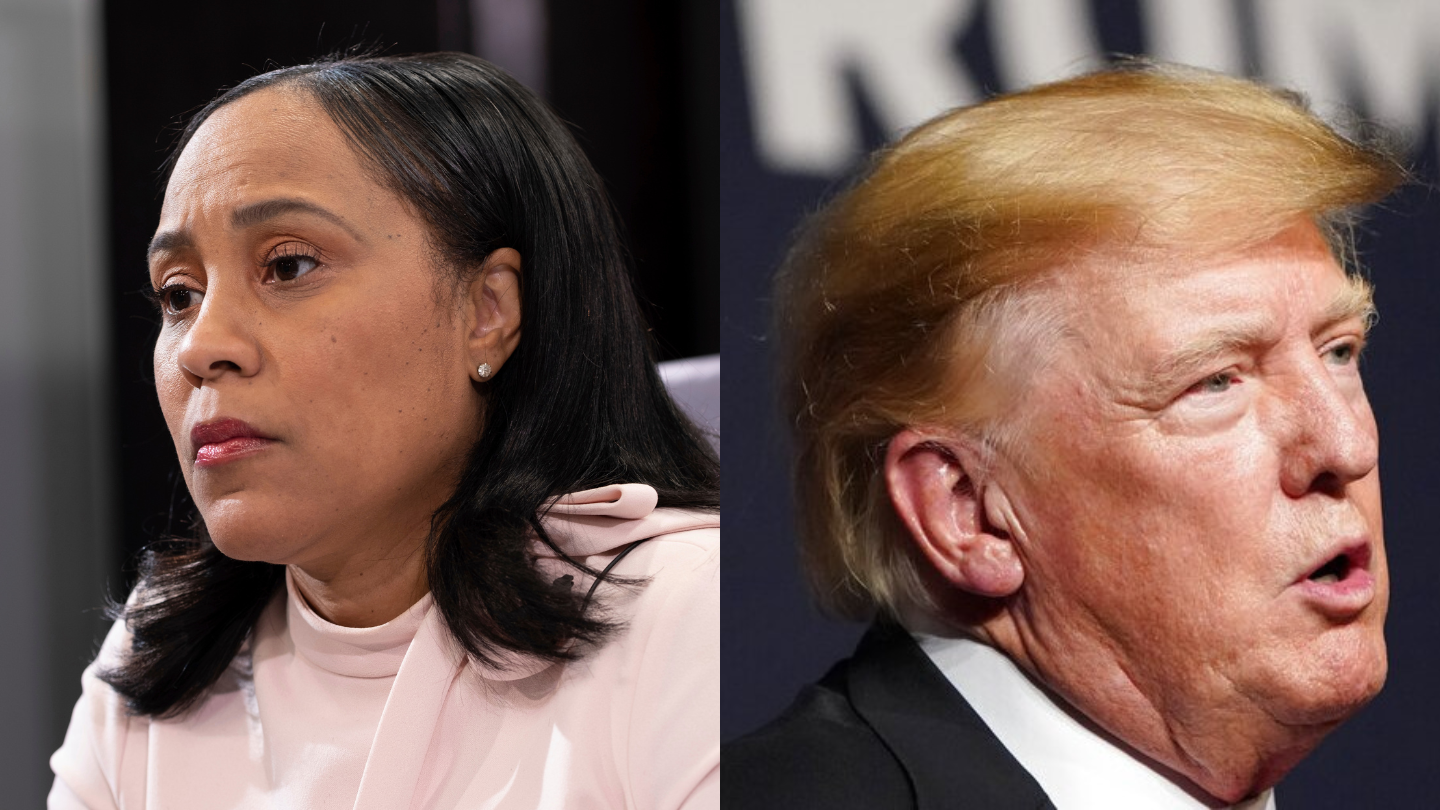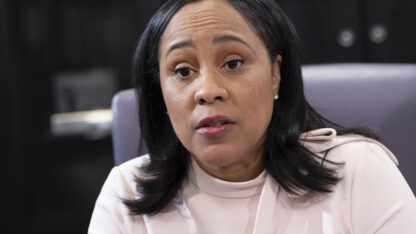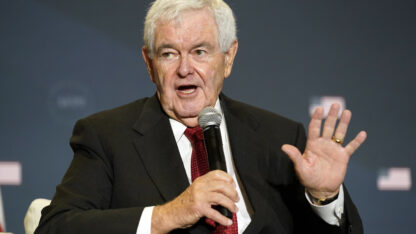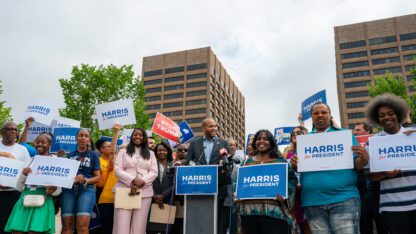5 things to know about the special grand jury investigating former President Trump and his allies

Led by Fulton County District Attorney Fani Willis, a special purpose grand jury is investigating whether former President Trump and his allies violated Georgia laws in their attempt to overturn the 2020 election. Here are five things to know about the ongoing investigation.
Click on a question to jump to the answer, or continue reading below.
2. What is a special grand jury — and what crimes is the panel likely looking at?
3. What do we know about the special grand jury’s work so far?
4. What’s the role of Fulton County Superior Court Judge Robert McBurney?
5. How does politics shape this investigation?
1. Why is Fani Willis the only local district attorney in the U.S. investigating former President Trump for tampering with the vote, when election interference also happened in other battleground states in 2020?
Fani Willis was likely willing to take on the case because she had more explicit evidence of election interference in Georgia than other states did, says WABE legal analyst Page Pate.
Exhibit number one is then-President Trump’s now-famous phone call to Georgia Secretary of State Brad Raffensperger in January 2021.
“All I want to do is this,” Trump told Raffensperger. “I just want to find 11,780 votes, which is one more than we have. Because we won the state.”
A month earlier, Trump campaign lawyer Rudy Giuliani showed up in Georgia and addressed a special committee in the Georgia Senate, spreading false claims about widespread voter fraud in Georgia.
Another target of the Fulton County probe: The 16 Republicans who attempted to submit a false slate of Georgia electors for Trump.
”So you have Trump on the phone, you have his lawyers and supporters selling false stories here in Georgia. And then you have a group of people in the state who decided to submit themselves as alternative electors,” Pate says. “So there’s a lot of evidence here in Georgia, probably more so than any other state. And you have a willing and aggressive prosecutor to look into it.”
Willis, a Democrat, was elected prosecutor just a few months before the November 2020 election — and has emphasized her willingness to take on sensitive cases.
“My career has taught me, no matter the political pressure, just do what’s right,” Willis told supporters as she was sworn into office. “And no matter if you were at the state Capitol or the slums, you will be held accountable if you commit a crime in my community.”
Norm Eisen, a fellow with the Brookings Institution who served as special counsel during Trump’s first impeachment, says the possible crimes tightly match specific Georgia laws, like criminal solicitation to commit election fraud. He also thinks Willis may be more free than the Justice Department to charge a former president.
“She’s not in D.C. She’s not a part of the Biden administration. She has more distance,” he says.
Back to the top2. What is a special grand jury — and what crimes is the panel likely looking at?
A regular grand jury in Fulton County is typically impaneled for two months and hears many different cases. A special grand jury is devoted to one investigation and can go for up to a year, though it cannot issue indictments.
“What it can do is issue a final report that would effectively be a roadmap as to all of the evidence it reviewed and make recommendations as to which charges, if any, would be appropriate based on that evidence,” Gwen Fleming, a former district attorney in Georgia, told WABE in January.
The special grand jury may be looking at a set of Georgia laws that deal with interference in an election or the voting process.
“We have a number of statutes in Georgia that criminalize conduct relating to everything from forging ballots to mishandling ballots to altering or accessing voting machines, or soliciting, asking someone else to do that,” Pate says. “Some of these state laws are misdemeanors, some are felonies, so the punishment can vary widely. There’s a good argument that Trump’s phone calls to Raffensperger could qualify as solicitation to interfere in the election and the phone call itself could be a crime.”
Pate says Trump’s defense would likely be that “that wasn’t his intent.”
Another category of Georgia laws deal with making false statements, which Pate says could apply to the hearing Rudy Giuliani held at the Georgia Capitol.
“If you’re submitting a false statement in connection with some governmental process, that’s a crime in Georgia,” Pate says.
A third category could be racketeering under the so-called RICO statutes. RICO stands for Racketeer Influenced and Corrupt Organizations Act. It was created in 1970 to go after organized crime and can be used for about 35 offenses. Election interference isn’t one of them, but making false statements is. RICO cases are not easy to make, Pate says.
“You’ve got to have predicate acts, like a series of crimes that form a pattern, and then a group, almost like a conspiracy that’s organized to carry out this crime,” he says.
In this case, Page says, Giuliani appearing in front of a committee and making two or more false statements could be enough to have a pattern for a racketeering charge. “And then you have to have this group, an enterprise they call it under RICO, which would be the Trump campaign. RICO violations carry a mandatory minimum of five years in prison. So it’s a serious crime.”
Building a RICO case is complicated, but Willis has done it before — most notably, as a lead prosecutor in the Atlanta school cheating scandal.
“If you’ve gotten one shot when you go into the doctor, you know what it feels like to take a shot,” says attorney Clint Rucker, who worked with Willis on that case. “So if you have to take two or three more, you can handle it.”
Back to the top3. What do we know about the special grand jury’s work so far?
This special grand jury has been meeting since May. Willis says jurors have already heard from 60% of the people they want to testify — and she expects them to complete their work by the end of the year.
The special grand jury works behind closed doors — so most of what we know is from court hearings and filings, when motions from witnesses or targets challenging the proceedings spill into court.
At first, jurors heard mostly from Georgians who witnessed former President Trump and his allies’ attempts to overturn Georgia’s election result.
By summer, prosecutors told some they weren’t just witnesses, but were now targets of the criminal investigation. That included the 16 false Georgia electors for Trump.
As subpoenas flowed from the Fulton County Courthouse this summer, the special grand jury reached deeper into Trump’s inner circle. Some pressed judges to quash court orders to testify. But by and large, judges have upheld the subpoenas. After a legal fight, campaign lawyer Rudy Giuliani appeared in August.
Judges have also upheld Republican U.S. Sen. Lindsey Graham’s subpoena so far — though he continues to fight it. And Gov. Brian Kemp’s subpoena has been upheld — though his testimony won’t happen until after the election.
More subpoenas are on the way — with prosecutors moving to compel testimony from Trump campaign lawyer Sidney Powell and former White House Chief of Staff Mark Meadows.
Back to the top4. What’s the role of Fulton County Superior Court Judge Robert McBurney?
Judge McBurney is the judge overseeing the investigation. He is not in the room when prosecutors and the special grand jury hear from witnesses in the investigation, but he is the person in charge of mediating any disputes between witnesses or targets and the prosecutors.
For example, McBurney recently disqualified Willis and the Fulton County district attorney’s office from prosecuting Republican State Sen. Burt Jones, one of the 16 false electors. That decision came after Willis held a political fundraiser for Jones’ opponent in the lieutenant governor’s race, Charlie Bailey.
Generally, McBurney has upheld the special grand jury’s requests for testimony, though he has tried to walk a fine line in managing a politically-sensitive investigation.
McBurney denied Gov. Brian Kemp’s request to quash his subpoena, but he did agree the testimony should be delayed until after the November election.
Back to the top5. How does politics shape this investigation?
It’s hard to argue with the fact that this investigation is politically sensitive. But many Republicans go a step further — saying this investigation is politically motivated.
Fulton County prosecutors say they take the letter of the law seriously and vow to prosecute anyone who commits crimes in their jurisdiction.
At the same time, district attorneys are elected by voters. They don’t have unlimited resources — and so they have to make practical, legal and political decisions about which cases to pursue.
Don Samuel, an Atlanta defense attorney representing the Georgia legislature in the proceedings, is skeptical of Fulton County’s investigation. He says the case is far from a sure bet. And meanwhile, it’s sponging resources from a district attorney’s office already backlogged with violent crime cases.
“When you take one case and say this is going to dominate our judicial system for weeks or months or a year, it’s just a political decision she needs to make. Is it worth it?
Twelve jurors are going to make a decision. And I’m not sure the people all across the country are going to say, well, that solved it. That’s not the way we’re going to be able to resolve this monumental dispute that is dividing our country right now,” Samuel said.
Norm Eisen, with the Brookings Institution, disagrees.
“We’ve just suffered through one of the greatest assaults on our democracy,” he says. “It’s not only about accountability for what happened before, but we will be defending our democracy going forward.”
Back to the top







